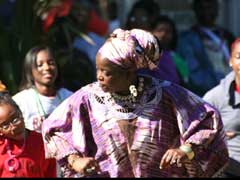There are few institutions born of circumstance with such longstanding records of contribution to their community as Penn Center, formerly known as Penn School. By living so long and so well, this institution has launched hundreds of lives on trajectories that, by their speed and light, have shown the way for thousands more in their lineage and beyond their family constellation.
As actual patriarchs or matriarchs of their families, Penn School graduates and individuals assisted by Penn Center have influenced future generations incalculably. The good works for and by the people of the Penn “community” find their origins in a time when Sea Islanders of African descent became free of slavery. Actual freedom, long denied and then attained, and how to use it, was what inspired Penn School’s founding. In the 150 years since, Penn School, now known as Penn Center, has helped light the path for determined individuals to best achieve their full potential.
By its induction of Ron Daise, Joseph Opala and the Unitarian Universalist Fellowship of Beaufort into the honored membership of the 1862 Circle, Penn Center is affirming in 2013 that its mission — connecting it from its hallowed past to the challenges of the present – remains to create leadership and provide the service that will allow one generation to advance from the sacrifices made and knowledge gained by its ancestors. The key to this magnificent accomplishment by Penn School through the years, and now Penn Center, has always been education. In 2013, the Penn Center 1862 Circle inductees all carry forward the connections from the past that inform our present and build our future.
Ron Daise, Chairman of the four-state, federal Gullah Geechee Cultural Heritage Corridor Commission, has found creative ways to honor and share his roots all his adult life. After graduating from Hampton University in Virginia with a B.A. in Mass Media Arts, he returned to St. Helena to become the first African-American reporter hired by the Beaufort Gazette. His first book, Reminiscences of Sea Island Heritage, Legacy of Freedmen on St. Helena Island conveyed his thorough knowledge of his subject, and included photographs from the Penn Center Collection. Mr. Daise and his wife Natalie created theater experiences for audiences to learn about and from this rich sea island heritage, including the award-winning TV show “Gullah Gullah Island.” In his most recent book, “Gullah Branches, West African Roots,” Mr. Daise uses memoir, photographs, poetry, and traditional and non-traditional music to document discoveries of personal and cultural connections with West Africa. His numerous awards include: the 1996 South Carolina Order of the Palmetto, the State’s highest honor; the 1997 State of South Carolina Folk Heritage Award, given for lifetime achievement and excellence in folk art; and the 2007 South Carolina African American Heritage Commission’s Lifetime Achievement Award. Mr. Daise asks people who compliment his many accomplishments, jokingly, “Well, aren’t you aware that I’m the son of Penn School graduates?” His mother, Kathleen Daise Grant, a school teacher before raising her nine children with Henry Daise, Sr., is the oldest living graduate of Penn School.
Joseph Opala, an historian, researcher and teacher, has focused extensively on the “Gullah Connection” – the long historical thread that links Africans in Sierra Leone and other West African countries with Gullah people in America. While a professor at the University of Sierra Leone from 1985 to 1991, Mr. Opala served as an advisor to Sierra Leone’s president on cultural policy. His research has led to historic visits, first by Sierra Leone’s president to an American Gullah community, and then an historic “Homecoming” to Sierra Leone the following year by nine Gullahs from South Carolina and Georgia. Other work by Mr. Opala connected an ancient African song preserved by a Gullah family in coastal Georgia to a village in Sierra Leone where the song is still sung today. His honors courses on such subjects as the “History of Slavery” and “African American Folk Culture Through Film” have engaged students on projects to design a “Gullah Connection Trail” for the U.S. Park Service, and to create a two-day “Gullah Film Festival” for the Smithsonian’s National Museum of Natural History. In recent years, he has served as advisor to the U.S. National Park Service on African American history, and as Scholar-in-Residence at Penn Center. Mr. Opala’s research and many bridge-building projects have drawn coverage by The New York Times, The Washington Post, and the Associated Press, and appearances on “60 Minutes,” CNN, and three programs on NPR – “The World,” “Fresh Air,” and “All Things Considered.”
The Unitarian Universalist Fellowship of Beaufort (UUFB) draws its inspiration directly from the founding of Penn School. In 1862 Laura Towne, inspired by the abolitionist sermons she heard at First Unitarian Church in Philadelphia, travelled to St. Helena Island to work with thousands of people newly freed from slavery. As homeopathic physician and teacher, she began to serve, leading people of many faiths in construction of Penn School for the betterment of local islanders. Her example compels UUFB members to proudly partner with Penn Center to continue its legacy of social justice.
During the last decade, Rev. Nan L. White and UUFB have actively engaged members of their Unitarian Universalist faith – local, regional, and national – in support of Penn Center. Many have come to Penn campus as volunteers, as attendees at conferences, and as inspired tourists. With a focus on programs for youth, UUFB members receive as they give, and are grateful for the opportunity to work at an institution whose mission is so steeped in noble history. In addition to its commitment to Penn Center, the UUFB congregation has been recognized for its volunteer work throughout the Beaufort area, whether tutoring students, delivering “rescued” food to the needy, providing meals and companionship for homeless families, nurturing local organic farming, or cleaning trash from our roads and waterways. The congregation’s service work is a clear reflection of a UUFB saying: “Many Beliefs – One Light.”
In their similarity – to draw on the past to inspire the present to improve the future – this year’s inductees to the 1862 Circle share the hope that Penn School represented to those newly freed. When we understand the lessons that our shared history presents, we are better able to build success and create opportunities for ourselves, and those who come behind us.
In addition to the 1862 Circle induction, this year Penn Center will honor the country of Sierra Leone with a “Common Roots Award”. By this award Penn Center is recognizing the ongoing relationships between the people of Sierra Leone and the residents of the Gullah Geechee Corridor in the United States.
Individual members of the 1862 Circle include: Emory S. Campbell, Vernon Jordan, Juan Williams, James Denmark, the Honorable John Lewis, Philip Simmons, the Honorable James E. Clyburn, Courtney Siceloff, Jonathan Green, Jean Moutoussamy-Ashe, the Honorable Ernest F. “Fritz.” Hollings, Thomas C Barnwell, Jr., Mary I. Mack, Phylicia Rashad, Pat Conroy, Roland Gardner, Louis O. Dore, and John W. Gadson, Sr. Groups that have been inducted include: The Penn Club, Inc., Sankofa Circle, Inc., and the University of North Carolina at Chapel Hill.
This year, the tenth annual 1862 Circle Gala is on May 18, 2013, at the Sonesta Resort on Hilton Head Island. A reception and silent auction will begin at 6:00 PM with the dinner, live auction and program scheduled for 7:00 PM, with music for the occasion by Lavon Stevens.







